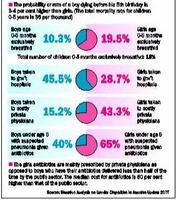
Gareth Manning, Sunday Gleaner Reporter
Girls are favoured over boys in the provision of high-quality health care and expenditure on medical treatment, the United Nations Children's Fund (UNICEF) has reported recently.
The report suggests caregivers, who are mostly mothers, generally spend more on girls' health than that of boys. This is despite baby boys being more likely to die from diseases, such as pneumonia - the prime cause of child mortality in Jamaica.
According to UNICEF's 'Situation Analysis on Gender Disparities in Jamaica 2007', the gender disparity in the age cohort zero to five years extends not only to health care, but to the degree of general care being given to children.
Data from the study of households show that 50 per cent fewer boys are breastfed than girls during their first five months of life. In fact, the incidence of breastfeeding in Jamaica is low by international standards, evidenced by only about 15 per cent of children in this age group being fed exclusively from the breast.
Facilities selected
The health care disparity revealed by UNICEF also extends to the type of facility selected by mothers. The report discloses that generally, boys, when ill, are taken to less expensive, public health-care facilities, such as clinics and public hospitals, while girls are taken to expensive private physicians for treatment.
Close to 65 per cent of girls with suspected pneumonia were given antibiotics delivered in three quarters of cases by private doctors, the data point out, compared with 40 per cent of boys whose antibiotics were supplied less than half the time by private physicians. The cost of drugs in the private sector is 60 per cent higher than in the public sector.
A cluster survey by the Statistical Institute of Jamaica supports UNICEF's claims that four to five per cent more boys are physically punished and left in inadequate care, leaving them more vulnerable to accidents, fires and sexual abuse.
Reflects social construct
UNICEF's representative to Jamaica, Bertrand Bainvel, says the data are reflecting a pervasive social construct: that males should be tougher than females.
"We feel that boys are tough enough to go through difficult situations when they are young ... When you give them too much care and attention, it might weaken them," he reasons.
Psychiatrist, Dr Geoffrey Walcott, says it is likely that part of the problem flows from Jamaica's high incidence of teenage pregnancy. He argues that teenage mothers are not equipped with the necessary parenting skills. He argues, too, that some mothers might be treating their sons worse than their daughters because the boys remind the mothers of their sons' delinquent fathers.
gareth.manning@gleanerjm.com

